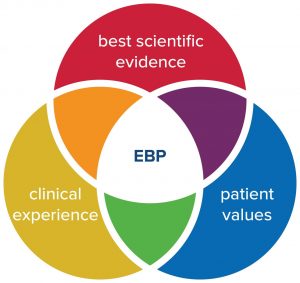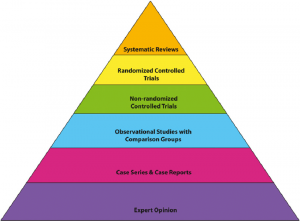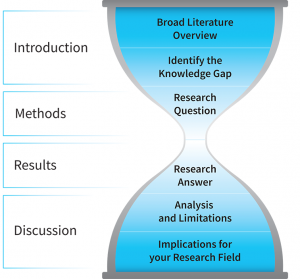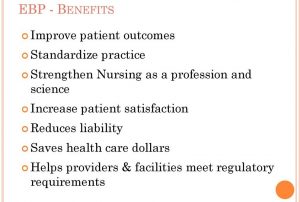In the dynamic realm of healthcare, nursing research plays a pivotal role in advancing the quality of care and patient outcomes. A well-constructed nursing research paper, grounded in evidence-based practice (EBP), is not just a collection of data but a powerful tool for shaping clinical practice, informing policy, and improving patient well-being. Crafting such a paper requires a systematic approach, meticulously integrating robust evidence with critical thinking and expert knowledge.
This article will delve into the essential strategies for using EBP to write a compelling and impactful nursing research paper. By understanding these strategies, nursing professionals can equip themselves to effectively translate research findings into practical clinical applications, fostering a culture of continuous learning and improvement.
What is Evidence-Based Practice in Nursing?
Evidence-Based Practice (EBP) in nursing is a systematic approach to clinical decision-making that integrates the best available evidence from research with clinical expertise and patient values. It emphasizes using the most up-to-date, scientifically sound information to guide nursing practice, ensuring that interventions and care are effective, safe, and tailored to the individual needs of each patient.

Here's a breakdown of the key components of EBP in nursing:
- Best Available Evidence:
- This refers to research findings from high-quality studies, primarily randomized controlled trials, systematic reviews, and meta-analyses.
- It also includes other sources of evidence, such as clinical practice guidelines, expert consensus statements, and patient-reported outcomes.
- Clinical Expertise:
- This encompasses the nurse's experience, knowledge, skills, and judgment acquired through education, training, and practice.
- It involves understanding the complexities of individual patients, recognizing potential risks and benefits of interventions, and making informed decisions within the context of the patient's situation.
- Patient Values:
- This refers to the patient's preferences, beliefs, and goals, which should always be considered and respected in healthcare decision-making.
- EBP emphasizes patient-centered care, involving patients in discussions about their treatment options and ensuring that their individual needs and wishes are met.
Why is EBP important for nursing?
- Improved Patient Outcomes: By using evidence-based approaches, nurses can provide care that is more effective, safe, and tailored to individual patient needs, leading to better health outcomes.
- Enhanced Quality of Care: EBP promotes the use of interventions and practices that have been proven to be effective, improving the overall quality of care delivered.
- Cost-Effectiveness: EBP can help identify interventions that are cost-effective, ensuring that resources are used wisely and efficiently.
- Reduced Risk of Errors: By relying on evidence, nurses can minimize the risk of errors and adverse events, promoting patient safety.
- Professional Advancement: EBP is essential for nurses to stay current with the latest research and advancements in their field, contributing to professional growth and development.
How is EBP implemented in nursing practice?
- Asking a focused clinical question: Nurses identify a clinical problem or question they need to address.
- Searching for the best available evidence: Nurses use databases and search strategies to find relevant research studies.
- Critically appraising the evidence: Nurses evaluate the quality, relevance, and applicability of the research findings.
- Synthesizing the evidence: Nurses integrate the findings from multiple studies to draw conclusions and formulate recommendations.
- Implementing the evidence into practice: Nurses develop and implement interventions, protocols, or guidelines based on the evidence.
- Evaluating the outcomes: Nurses assess the impact of the intervention on patient outcomes and make adjustments to their practice as needed.
By embracing EBP, nurses become active participants in the continuous improvement of healthcare. They contribute to a culture of evidence-informed decision-making, ensuring that their practice is grounded in the best available knowledge and delivering the highest quality of care to their patients.
Using Evidence Based Practice to Write a Nursing Research Paper
- Defining the Research Question: A Foundation of Evidence
Before embarking on the research journey, it is imperative to clearly define the research question. This question serves as the compass, guiding the entire research process and ensuring the investigation remains focused and relevant. An effective research question should be:
- Specific: Clearly define the area of investigation, avoiding broad or ambiguous terms.
- Measurable: Allow for quantifiable data collection and analysis.
- Achievable: Be feasible within the scope of the study and available resources.
- Relevant: Address a significant issue within the field of nursing practice.
- Time-bound: Set a clear timeframe for the research project.

For example, instead of asking a broad question like "What are the challenges of providing wound care in elderly patients?", a more specific and measurable research question could be: "What is the effectiveness of negative pressure wound therapy compared to traditional wound dressing methods in reducing healing time and complications in hospitalized elderly patients with pressure ulcers?"
- The EBP Pyramid: A Framework for Selecting Relevant Evidence
Once the research question is established, the next step involves navigating the vast landscape of medical literature to find the most relevant and credible evidence. The EBP pyramid provides a hierarchical framework for organizing evidence based on its strength and validity.
- At the pinnacle: Systematic reviews and meta-analyses offer the strongest evidence, summarizing findings from multiple studies.
- Below: Randomized controlled trials (RCTs) provide high-quality evidence from controlled experiments.
- Further down: Cohort studies, case-control studies, and case series offer valuable insights but with limitations in terms of control and bias.
- At the base: Expert opinions, clinical practice guidelines, and narrative reviews provide valuable context and insights but should be considered with caution.

By understanding this pyramid, researchers can prioritize the most reliable sources of information, ensuring the integrity and robustness of their nursing research paper.
- Navigating the Labyrinth of Databases: The Art of Effective Literature Search
A comprehensive literature search is crucial for uncovering the existing body of knowledge surrounding the research question. Several databases cater specifically to nursing and healthcare research, each with its own strengths and functionalities.
- CINAHL: The Cumulative Index to Nursing and Allied Health Literature is a comprehensive database focusing on nursing, allied health, and biomedical literature.
- MEDLINE: A vast database encompassing biomedical literature, including a wealth of nursing research publications.
- Nursing Papers: A professional academic writing platform with a collection of well-articulated nursing essays, research papers, case studies and dissertations for proper research.
- Cochrane Library: A gold standard for systematic reviews and meta-analyses, providing high-quality evidence on a wide range of health interventions.
- PubMed: A free database maintained by the National Library of Medicine, offering access to a broad spectrum of biomedical research.
Effective search strategies are paramount for maximizing the yield of the literature search. Combining relevant keywords, Boolean operators (AND, OR, NOT), and search filters can narrow down the search results and identify the most pertinent studies.
- Critically Appraising the Evidence: Assessing Quality and Relevance
After gathering a pool of relevant studies, it is essential to critically evaluate their quality and relevance to the research question. This process involves assessing the study design, methods, data analysis, and potential biases. Several tools exist to facilitate this critical appraisal:
- The GRADE system: A framework for assessing the quality of evidence and its strength of recommendation.
- The CASP tool: A checklist designed to guide the critical appraisal of a variety of research designs.
- The Joanna Briggs Institute Critical Appraisal Tools: A collection of tools tailored to specific study designs, such as RCTs, cohort studies, and qualitative research.
By rigorously appraising the evidence, researchers ensure that the findings incorporated into their nursing research paper are robust and reliable.
- Integrating the Evidence: Weaving a Coherent Narrative
The process of writing the nursing research paper involves more than simply summarizing individual studies. It requires a synthesis of the gathered evidence, drawing meaningful connections and constructing a compelling narrative.
- Review of Literature: This section provides a comprehensive overview of the existing literature related to the research question.
- Methodology: This section outlines the research design, participants, data collection methods, and data analysis techniques employed in the study.
- Results: This section presents the findings of the research, incorporating relevant data, tables, and figures to support the narrative.
- Discussion: This section interprets the findings, drawing comparisons with existing literature and highlighting the implications for nursing practice.
- Conclusion: This section summarizes the key findings and reiterates the significance of the research in relation to the research question.

Throughout the writing process, it is crucial to maintain clarity, objectivity, and a consistent flow of thought, effectively communicating the research findings to the intended audience.
- Addressing the Ethical Considerations: Ensuring Responsible Research Practices
Ethical considerations are paramount in research, particularly in the realm of healthcare. Before conducting any research, it is essential to obtain informed consent from participants and ensure their privacy and confidentiality. Additionally, researchers must adhere to ethical guidelines outlined by institutions, professional bodies, and international ethical review boards.
Ethical considerations must be explicitly addressed in the nursing research paper, demonstrating a commitment to responsible research practices and protecting the well-being of participants.
- Disseminating the Research: Sharing Knowledge and Promoting Impact
The final step in the research journey involves disseminating the findings to the wider nursing community. This can be achieved through various channels:
- Publication in peer-reviewed journals: This allows for the dissemination of research findings to a broader audience of nursing professionals, researchers, and policymakers.
- Presentation at conferences: This provides a platform for researchers to share their findings, engage in discussions, and receive feedback from colleagues.
- Translation into clinical practice: This involves translating research findings into practical guidelines, tools, and protocols that can be readily implemented in clinical settings.
Dissemination of findings ensures that the research has a real-world impact, contributing to the advancement of nursing practice and improving patient care.
Examples of Using EBP to Write a Nursing Research Paper
Example 1: "The Impact of Mindfulness-Based Stress Reduction on Anxiety Levels in Cancer Patients Undergoing Chemotherapy"
Research Question: Does mindfulness-based stress reduction (MBSR) intervention reduce anxiety levels in cancer patients undergoing chemotherapy compared to standard care?
EBP Approach: The researcher conducts a systematic review of randomized controlled trials (RCTs) examining the effectiveness of MBSR for anxiety in cancer patients. The GRADE system is used to assess the quality of evidence and strength of recommendation. Findings from the review are integrated into the nursing research paper, highlighting the effectiveness of MBSR in reducing anxiety levels in this vulnerable population.
Example 2: "Exploring the Lived Experiences of Nurses Caring for Patients with Chronic Pain"
Research Question: What are the lived experiences of nurses caring for patients with chronic pain?
EBP Approach: The researcher utilizes a qualitative methodology, conducting in-depth interviews with nurses working in pain management settings. Themes and patterns are identified through thematic analysis, drawing insights from the narratives of nurses about their experiences, challenges, and strategies for providing compassionate and effective care.
Example 3: "Developing a Standardized Protocol for Fall Prevention in Elderly Patients Admitted to Hospital"
Research Question: Does a standardized fall prevention protocol reduce the incidence of falls in elderly patients admitted to hospital?
EBP Approach: The researcher combines evidence from systematic reviews, clinical practice guidelines, and expert opinions to develop a comprehensive fall prevention protocol. This protocol is then implemented in a pilot study, evaluating its effectiveness in reducing falls and improving patient safety.
Fostering a Culture of EBP in Nursing Research
Integrating EBP into the process of writing a nursing research paper is not just a technical exercise but a fundamental commitment to the ethical and scientific responsibility of the profession. By adhering to the principles of EBP, nursing researchers ensure that their work is grounded in robust evidence, contributing to the advancement of nursing knowledge, improving patient outcomes, and shaping the future of healthcare.

Through meticulous literature searches, critical appraisal, and a systematic approach to integrating evidence, nursing professionals can write compelling and impactful nursing research papers, contributing to a culture of continuous learning and innovation in the field. The ultimate goal of EBP in nursing research is to elevate the standard of care, empowering nurses to make informed decisions, advocate for their patients, and ultimately, enhance the quality of life for all.
Get Professional Nursing Research Paper Help
Using EBP to write a nursing research paper can be one of the most challenging academic assignments, especially to beginners. But, why go through all the stress when you can easily order a complete paper from
Academia Scholars? We offer professional research paper help for undergraduate, Degree, Master’s and Doctoral nursing courses. We can also help you with writing original
nursing essays, case studies and
dissertations.
 Here's a breakdown of the key components of EBP in nursing:
Here's a breakdown of the key components of EBP in nursing:
 For example, instead of asking a broad question like "What are the challenges of providing wound care in elderly patients?", a more specific and measurable research question could be: "What is the effectiveness of negative pressure wound therapy compared to traditional wound dressing methods in reducing healing time and complications in hospitalized elderly patients with pressure ulcers?"
For example, instead of asking a broad question like "What are the challenges of providing wound care in elderly patients?", a more specific and measurable research question could be: "What is the effectiveness of negative pressure wound therapy compared to traditional wound dressing methods in reducing healing time and complications in hospitalized elderly patients with pressure ulcers?"
 By understanding this pyramid, researchers can prioritize the most reliable sources of information, ensuring the integrity and robustness of their nursing research paper.
By understanding this pyramid, researchers can prioritize the most reliable sources of information, ensuring the integrity and robustness of their nursing research paper.
 Throughout the writing process, it is crucial to maintain clarity, objectivity, and a consistent flow of thought, effectively communicating the research findings to the intended audience.
Throughout the writing process, it is crucial to maintain clarity, objectivity, and a consistent flow of thought, effectively communicating the research findings to the intended audience.
 Through meticulous literature searches, critical appraisal, and a systematic approach to integrating evidence, nursing professionals can write compelling and impactful nursing research papers, contributing to a culture of continuous learning and innovation in the field. The ultimate goal of EBP in nursing research is to elevate the standard of care, empowering nurses to make informed decisions, advocate for their patients, and ultimately, enhance the quality of life for all.
Through meticulous literature searches, critical appraisal, and a systematic approach to integrating evidence, nursing professionals can write compelling and impactful nursing research papers, contributing to a culture of continuous learning and innovation in the field. The ultimate goal of EBP in nursing research is to elevate the standard of care, empowering nurses to make informed decisions, advocate for their patients, and ultimately, enhance the quality of life for all.